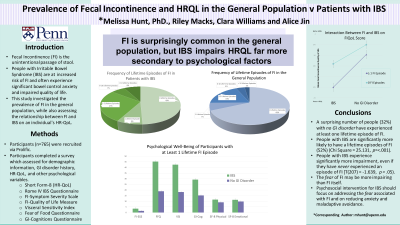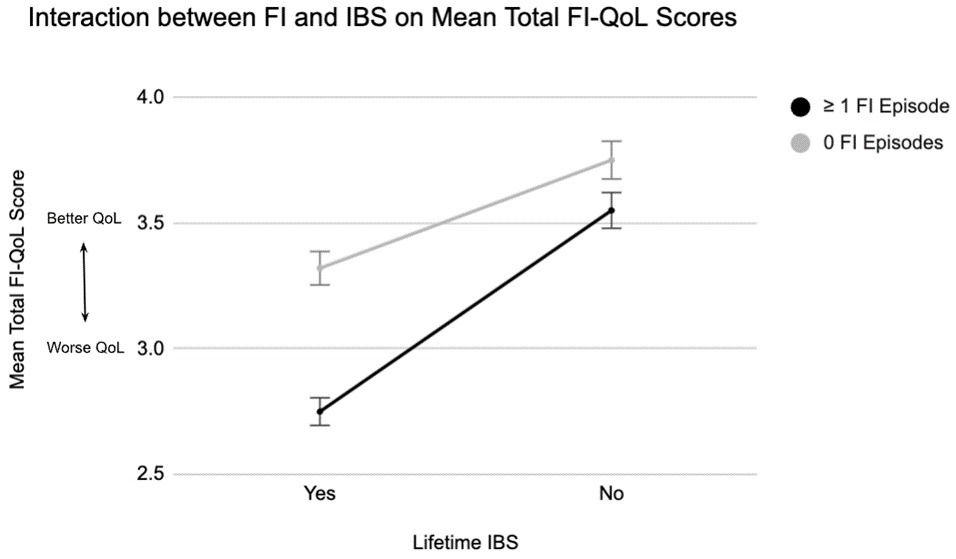Tuesday Poster Session
Category: Functional Bowel Disease
P4065 - Prevalence of Fecal Incontinence and Quality of Life in the General Population Versus Patients With IBS
Tuesday, October 29, 2024
10:30 AM - 4:00 PM ET
Location: Exhibit Hall E

Has Audio

Melissa G. Hunt, PhD
University of Pennsylvania
Philadelphia, PA
Presenting Author(s)
Melissa G. Hunt, PhD, Riley C. Macks, BA, Clara G. Williams, BA, Alice Jin,
University of Pennsylvania, Philadelphia, PA
Introduction: Irritable bowel syndrome (IBS) is a significant risk factor for fecal incontinence (FI), with approximately 25% of IBS patients meeting Rome IV criteria for recent FI (Goodoory et al., 2023) and up to 60% of IBS patients having experienced at least one lifetime episode of FI (Hunt et al., 2018). In IBS, fear of FI can significantly impact quality of life, and can lead to anxiety, catastrophizing and maladaptive avoidance. However, the prevalence and psychological impact of FI in the general (non-GI disordered) population remains unknown. The goal of the current study was to establish the prevalence of FI (both current Rome IV and lifetime) and its psychological impact in non-GI disordered individuals compared to patients with IBS.
Methods: 756 participants were recruited from Prolific and assessed using the Rome IV IBS Questionnaire, the Fecal Incontinence Symptom Severity Scale (FI-SSS), the Fecal Incontinence Quality of Life (FI-QoL), the Short-Form 8, the Fear of Food Questionnaire, the Visceral Sensitivity Index and the Gastrointestinal Cognitions Questionnaire.
Results: 222 individuals met current Rome IV criteria for IBS and/or reported a lifetime diagnosis of IBS and were included in the IBS sample. 490 individuals reported no IBS and no other GI disorder and were included in the non-GI sample. 52% of IBS patients reported at least one lifetime episode of FI, with 27.5% meeting Rome IV FI criteria. In the non-GI sample, 31% reported at least one lifetime episode, with 10.2% meeting Rome IV FI criteria. IBS was a significant risk factor for FI [OR 3.33, 95% CI 2.2-5.05, p< .0001], but the rates in the general population were also fairly high. Both IBS and FI were independent risk factors for worse quality of life and psychological adjustment across all measures (all p< .001), but there was also a significant interaction between IBS and FI such that IBS patients with no history of FI reported worse FI-QoL scores than non-GI disordered individuals with a history of FI.
Discussion: Although IBS is a significant risk factor for FI, up to 30% of the general, non-GI disordered population has also experienced a lifetime episode of FI. However, they do not seem to be as distressed or impaired by the experience of FI as people with IBS.

Disclosures:
Melissa G. Hunt, PhD, Riley C. Macks, BA, Clara G. Williams, BA, Alice Jin, . P4065 - Prevalence of Fecal Incontinence and Quality of Life in the General Population Versus Patients With IBS, ACG 2024 Annual Scientific Meeting Abstracts. Philadelphia, PA: American College of Gastroenterology.
University of Pennsylvania, Philadelphia, PA
Introduction: Irritable bowel syndrome (IBS) is a significant risk factor for fecal incontinence (FI), with approximately 25% of IBS patients meeting Rome IV criteria for recent FI (Goodoory et al., 2023) and up to 60% of IBS patients having experienced at least one lifetime episode of FI (Hunt et al., 2018). In IBS, fear of FI can significantly impact quality of life, and can lead to anxiety, catastrophizing and maladaptive avoidance. However, the prevalence and psychological impact of FI in the general (non-GI disordered) population remains unknown. The goal of the current study was to establish the prevalence of FI (both current Rome IV and lifetime) and its psychological impact in non-GI disordered individuals compared to patients with IBS.
Methods: 756 participants were recruited from Prolific and assessed using the Rome IV IBS Questionnaire, the Fecal Incontinence Symptom Severity Scale (FI-SSS), the Fecal Incontinence Quality of Life (FI-QoL), the Short-Form 8, the Fear of Food Questionnaire, the Visceral Sensitivity Index and the Gastrointestinal Cognitions Questionnaire.
Results: 222 individuals met current Rome IV criteria for IBS and/or reported a lifetime diagnosis of IBS and were included in the IBS sample. 490 individuals reported no IBS and no other GI disorder and were included in the non-GI sample. 52% of IBS patients reported at least one lifetime episode of FI, with 27.5% meeting Rome IV FI criteria. In the non-GI sample, 31% reported at least one lifetime episode, with 10.2% meeting Rome IV FI criteria. IBS was a significant risk factor for FI [OR 3.33, 95% CI 2.2-5.05, p< .0001], but the rates in the general population were also fairly high. Both IBS and FI were independent risk factors for worse quality of life and psychological adjustment across all measures (all p< .001), but there was also a significant interaction between IBS and FI such that IBS patients with no history of FI reported worse FI-QoL scores than non-GI disordered individuals with a history of FI.
Discussion: Although IBS is a significant risk factor for FI, up to 30% of the general, non-GI disordered population has also experienced a lifetime episode of FI. However, they do not seem to be as distressed or impaired by the experience of FI as people with IBS.

Figure: Figure 1 - Interaction between FI and IBS on Mean Total FI-QoL Scores
Disclosures:
Melissa Hunt indicated no relevant financial relationships.
Riley Macks indicated no relevant financial relationships.
Clara Williams indicated no relevant financial relationships.
Alice Jin indicated no relevant financial relationships.
Melissa G. Hunt, PhD, Riley C. Macks, BA, Clara G. Williams, BA, Alice Jin, . P4065 - Prevalence of Fecal Incontinence and Quality of Life in the General Population Versus Patients With IBS, ACG 2024 Annual Scientific Meeting Abstracts. Philadelphia, PA: American College of Gastroenterology.
